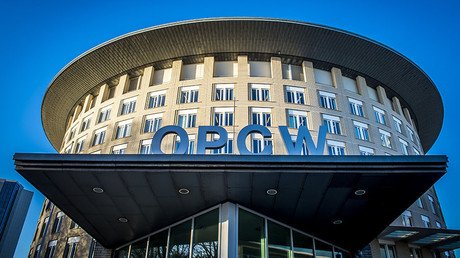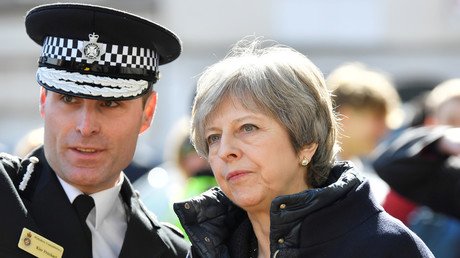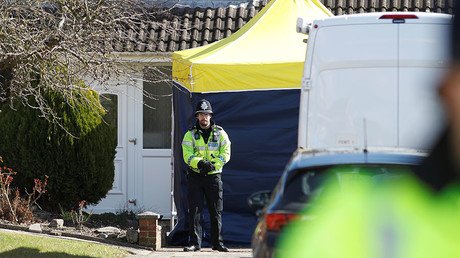No 100% assurance toxin’s origin can be determined – ex-UN chemical weapons expert on Skripal case
While there could be no way to accurately determine the origin of the toxin used against Sergei Skripal, the OPCW's reluctance to address Russia's concerns about the probe undermines its credibility, a former UN inspector told RT.
The international chemical weapons watchdog will undermine its own credibility if it refuses to address Russia's concerns about the probe into the poisoning of Sergei Skripal and his daughter, Anton Utkin, a former UN chemical weapons inspector in Iraq, told RT.
Moscow's bid for a joint Russia-UK investigation into the Skripal case has been voted down at the extraordinary session of the Organisation for the Prohibition of Chemical Weapons (OPCW) on Wednesday, leaving Russia's concerns and questions about the Salisbury poisoning unanswered.
While Russia accused London of attempting to take advantage of the OPCW to support its own unsubstantiated claims, Dr. Anton Utkin, a former UN inspector in Iraq told RT that Wednesday's decision could undermine the only international mechanism designed to shield humanity from chemical weapons.
"If Russia asks the Executive Council to provide some sort of information, there is no way the OPCW can reject that request. So it is written strictly in the convention. If the OPCW starts to break the rules written in the convention, it will break the whole mechanism of protection of chemical weapons," Utkin told RT.
"It is very risky for the organization to break this rule, especially from the technical secretariat, which is supposed to stay out of any politics," he explained. "And a lot of countries do not like that the United Kingdom brought this political issue, pure political issue, to the walls of the organization."
READ MORE: Russia says it received only one substantive answer from OPCW over Skripal case
Sergei Skripal and his daughter Yulia were discovered on a bench in Salisbury in early March showing signs of intoxication. Without a proper investigation being carried out, London rushed to accuse Russia of the attack, claiming that a Soviet-designed A-234 nerve agent of the Novichok family was used.
Moscow has denied the accusations and demanded that the British side rely on hard facts instead of empty rhetoric . However, London refused Russia any cooperation on the case, denying its consular staff access to Russian citizen Yulia Skripal and turning down the request for a sample of the toxic substance in question.
This week British government scientists from the Porton Dawn lab admitted they couldn't tell where the toxin came from, undermining a number of claims by the Foreign Office and UK's chief diplomat, Boris Johnson, who directly pointed the finger at Russia.
#Zakharova: Porton Down chief Gary Aitkenhead announced that he cannot confirm that the nerve agent used to poison Sergey Skripal and his daughter was produced in Russia pic.twitter.com/JPDOHWCIfF
— MFA Russia 🇷🇺 (@mfa_russia) April 4, 2018
After Russia's proposal for a joint investigation was rejected, it has called for an emergency session of the UN Security Council on the Skripal poisoning case for Thursday, just days before the OPCW is expected to finalize its probe on the matter. The verdict is expected to be received by early next week, OPCW's chief Ahmet Uzumcu promised on Wednesday, but the content of the findings will only be released to Britain.
READ MORE: We don’t want apologies, we want common sense to triumph – Putin on Skripal saga
"The Secretariat will produce a report on the basis of these results and will transmit a copy of this report to the United Kingdom. The report will reflect the findings of the designated laboratories. Access of other States Parties to the report will be subject to the agreement of the United Kingdom," Uzumcu noted.
Dr. Utkin, however, is certain, that the OPCW probe, just like Porton Down's investigation, will not determine the origins of the chemical used on the Skripals. "They will say, in those samples, from those sites, we found those chemicals. Nothing else," he told RT.
READ MORE: Porton Down scientists CANNOT confirm nerve agent used on Skripals was made in Russia
"There is no 100 percent assurance that you can determine the origins of a chemical. Everything we know about a chemical comes from its composition. The chemical is never 100 percent pure, it takes some impurities...they come from production," the scientist explained. "But if you have two laboratories in different countries of the world that produce the same chemical with the same technology, with the same reagents, you have no chance of telling which sample came from which laboratory."
Think your friends would be interested? Share this story!















